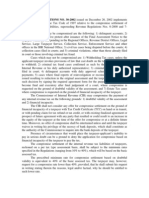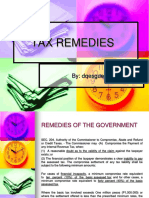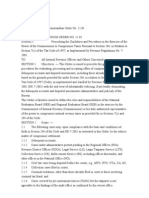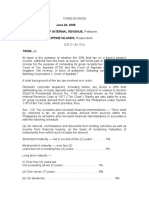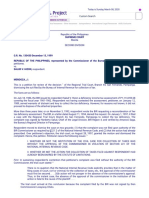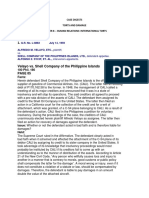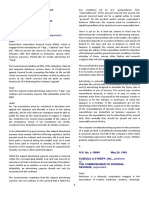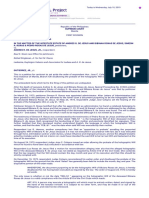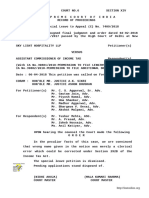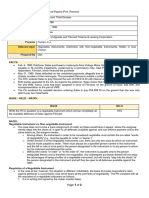0 ratings0% found this document useful (0 votes)
79 viewsDigest RR 7-2001 PDF
Digest RR 7-2001 PDF
Uploaded by
Mae TrabajoThis document summarizes Revenue Regulations No. 7-2001, which implements the compromise settlement of internal revenue tax liabilities in the Philippines. It outlines what types of tax cases may and may not be compromised, including delinquent accounts, cases under administrative protest, and civil/criminal tax cases. It also provides the basis for acceptance of compromise settlements as doubtful validity of assessment or financial incapacity. Minimum rates for compromise settlement are defined based on the basic assessed tax and taxpayer conditions. Compromise settlements above 500,000 PHP must be approved by the National Evaluation Board, while lower offers can be approved by the Regional Evaluation Board.
Copyright:
© All Rights Reserved
Available Formats
Download as PDF, TXT or read online from Scribd
Digest RR 7-2001 PDF
Digest RR 7-2001 PDF
Uploaded by
Mae Trabajo0 ratings0% found this document useful (0 votes)
79 views1 pageThis document summarizes Revenue Regulations No. 7-2001, which implements the compromise settlement of internal revenue tax liabilities in the Philippines. It outlines what types of tax cases may and may not be compromised, including delinquent accounts, cases under administrative protest, and civil/criminal tax cases. It also provides the basis for acceptance of compromise settlements as doubtful validity of assessment or financial incapacity. Minimum rates for compromise settlement are defined based on the basic assessed tax and taxpayer conditions. Compromise settlements above 500,000 PHP must be approved by the National Evaluation Board, while lower offers can be approved by the Regional Evaluation Board.
Original Title
Digest RR 7-2001.pdf
Copyright
© © All Rights Reserved
Available Formats
PDF, TXT or read online from Scribd
Share this document
Did you find this document useful?
Is this content inappropriate?
This document summarizes Revenue Regulations No. 7-2001, which implements the compromise settlement of internal revenue tax liabilities in the Philippines. It outlines what types of tax cases may and may not be compromised, including delinquent accounts, cases under administrative protest, and civil/criminal tax cases. It also provides the basis for acceptance of compromise settlements as doubtful validity of assessment or financial incapacity. Minimum rates for compromise settlement are defined based on the basic assessed tax and taxpayer conditions. Compromise settlements above 500,000 PHP must be approved by the National Evaluation Board, while lower offers can be approved by the Regional Evaluation Board.
Copyright:
© All Rights Reserved
Available Formats
Download as PDF, TXT or read online from Scribd
Download as pdf or txt
0 ratings0% found this document useful (0 votes)
79 views1 pageDigest RR 7-2001 PDF
Digest RR 7-2001 PDF
Uploaded by
Mae TrabajoThis document summarizes Revenue Regulations No. 7-2001, which implements the compromise settlement of internal revenue tax liabilities in the Philippines. It outlines what types of tax cases may and may not be compromised, including delinquent accounts, cases under administrative protest, and civil/criminal tax cases. It also provides the basis for acceptance of compromise settlements as doubtful validity of assessment or financial incapacity. Minimum rates for compromise settlement are defined based on the basic assessed tax and taxpayer conditions. Compromise settlements above 500,000 PHP must be approved by the National Evaluation Board, while lower offers can be approved by the Regional Evaluation Board.
Copyright:
© All Rights Reserved
Available Formats
Download as PDF, TXT or read online from Scribd
Download as pdf or txt
You are on page 1of 1
REVENUE REGULATIONS NO.
7-2001 issued August 1, 2001 further implements the
compromise settlement of internal revenue tax liabilities. Cases which may be
compromised are: 1) delinquent accounts; 2) cases under administrative protest pending
in the Regional Offices, Revenue District Offices, Legal Service, Large Taxpayers Service
(LTS), Collection Service, Enforcement Service and other offices in the National Office;
3) civil tax cases being disputed before the courts; 4) collection cases filed in courts;
5) criminal violations, other than those already filed in court or those involving criminal tax
fraud; and 6) cases covered by pre-assessment notices wherein taxpayer is not
agreeable to the findings of the audit office as confirmed by the review office.
Cases that cannot be compromised are: 1) withholding tax cases; 2) criminal tax
fraud cases; 3) criminal violations already filed in court; 4) delinquent accounts with duly
approved schedule of installment payments; 5) cases where final reports of
reinvestigation or reconsideration have been issued resulting to reduction in the original
assessment; and 6) cases which become final and executory after final judgement of a
court.
The basis for the acceptance of compromise settlement are: 1) doubtful validity of
the assessment; and 2) financial incapacity. The prescribed minimum rates (based on the
basic assessed tax) for the compromise settlement of tax liabilities reckoned on a per tax
type assessment basis are: a) 10% in cases of financial incapacity; and b) 40% in cases
of doubtful validity. The prescribed minimum rate is 20% if the taxpayer is under any of
the following conditions: 1) dissolved corporations; 2) non-operating companies for a
period of less than three (3) years; and 3) surplus or earnings deficit resulting to
impairment in the original capital by at least 50%.
All compromise settlements within the jurisdiction of the National Office shall be
approved by the National Evaluation Board (NEB) composed of the Commissioner and
the four Deputy Commissioners.
Offers of compromise assessments issued by the Regional Offices involving basic
deficiency taxes of P500,000 or less, including minor criminal violations discovered by the
Regional and District Offices, shall be subject to the approval by the Regional Evaluation
Board. If the offer of compromise is less than the prescribed rates set forth in Sec. 4 of
the Regulations, the same shall always be subject to the approval of the NEB.
You might also like
- Guevarra V BanachDocument2 pagesGuevarra V BanachRishell Miral100% (2)
- Lecture Notes Tax Enforcement PDFDocument7 pagesLecture Notes Tax Enforcement PDFEstele EstellaNo ratings yet
- brief-CLP India Pvt. Ltd. v. Gujarat Urja Vikas NigamDocument6 pagesbrief-CLP India Pvt. Ltd. v. Gujarat Urja Vikas NigamAditi BanerjeeNo ratings yet
- Business Law Cpa Board Exam Lecture Notes: I. (CO, NO)Document27 pagesBusiness Law Cpa Board Exam Lecture Notes: I. (CO, NO)Shin MelodyNo ratings yet
- Compromise of BIR Tax LiabilityDocument2 pagesCompromise of BIR Tax LiabilityIssaRoxas75% (4)
- Ac 5288Document31 pagesAc 5288Choco KookieNo ratings yet
- RR No. 30-02Document1 pageRR No. 30-02Joanna MandapNo ratings yet
- Definitions: 6. Transitional Input VATDocument8 pagesDefinitions: 6. Transitional Input VATFenina ReyesNo ratings yet
- Revenue Regulations 4-2019Document41 pagesRevenue Regulations 4-2019HaRry PeregrinoNo ratings yet
- Compromise ReportDocument11 pagesCompromise ReportAnonymous LZgIlI0YqTNo ratings yet
- Module 1 Bureau of Internal Revenue, Functions and PowersDocument8 pagesModule 1 Bureau of Internal Revenue, Functions and PowersSkyline PiscesNo ratings yet
- Revenue Memorandum Order No. 23-2006: Bureau of Internal RevenueDocument7 pagesRevenue Memorandum Order No. 23-2006: Bureau of Internal RevenueRufino Gerard Moreno IIINo ratings yet
- Jurisdiction of Cta Enbanc and DivisionDocument12 pagesJurisdiction of Cta Enbanc and DivisionJune Karl CepidaNo ratings yet
- Proposed RR Tax DelinquenciesDocument7 pagesProposed RR Tax DelinquenciesEster RebanalNo ratings yet
- Bustax 8 NotesDocument2 pagesBustax 8 NotesnicNo ratings yet
- RR 30-2002 CompromiseDocument11 pagesRR 30-2002 CompromiseBobby Olavides SebastianNo ratings yet
- Tax - 4 - Module - 3 With AnswerDocument14 pagesTax - 4 - Module - 3 With AnswerDanielNo ratings yet
- Q and A Assignment Tax ReviewDocument3 pagesQ and A Assignment Tax ReviewAlgen S. GomezNo ratings yet
- CTA JurisDocument3 pagesCTA JurisPearlMargaretGanzonNo ratings yet
- CTA Jurisdiction.01Document3 pagesCTA Jurisdiction.01kriziagwapoNo ratings yet
- City of Manila vs. Hon. Caridad Grecia-Cuerdo, RTC Pasay Et AlDocument6 pagesCity of Manila vs. Hon. Caridad Grecia-Cuerdo, RTC Pasay Et AlAP CruzNo ratings yet
- 13 BIR RMO No. 20-2007Document3 pages13 BIR RMO No. 20-2007Clarissa Sawali100% (1)
- Tax Review Remedies of The GovernmentDocument120 pagesTax Review Remedies of The GovernmentJaline Aquino MozoNo ratings yet
- Tax ReviewerDocument68 pagesTax Reviewerviva_33No ratings yet
- Cta 1D CV 09783 J 2022may11 AssDocument10 pagesCta 1D CV 09783 J 2022may11 AssVince Lupango (imistervince)No ratings yet
- 2000 Revenue Regulations - The Lawphil ProjectDocument4 pages2000 Revenue Regulations - The Lawphil ProjectCherry ursuaNo ratings yet
- Tax - 4 - Module - 4 With AnswerDocument6 pagesTax - 4 - Module - 4 With AnswerDanielNo ratings yet
- Judicial RemediesDocument37 pagesJudicial RemediesIc San PedroNo ratings yet
- Legal Research: Estate Tax AmnestyDocument5 pagesLegal Research: Estate Tax Amnestyphoebemariealhambra1475No ratings yet
- RemediesDocument45 pagesRemediesCzarina100% (1)
- 2 Authority of The Commissioner of Internal RevenueDocument12 pages2 Authority of The Commissioner of Internal RevenueAngel MarieNo ratings yet
- Republic Act No. 1125 June 16, 1954 An Act Creating The Court of Tax AppealsDocument4 pagesRepublic Act No. 1125 June 16, 1954 An Act Creating The Court of Tax AppealsLj Montina Bontia ShesuMaruNo ratings yet
- Module 2 Tax AdminDocument19 pagesModule 2 Tax Adminkristeldesigns825No ratings yet
- RR 15-2007 PDFDocument4 pagesRR 15-2007 PDFnaldsdomingoNo ratings yet
- 2 Authority of The Commissioner of Internal Revenue 1Document13 pages2 Authority of The Commissioner of Internal Revenue 1Catherine AlzagaNo ratings yet
- W3 Module 3 - Tax Administration Part IIDocument14 pagesW3 Module 3 - Tax Administration Part IIElmeerajh JudavarNo ratings yet
- ONETT - RMO 15-2003 - Policies&GuidelinesDocument19 pagesONETT - RMO 15-2003 - Policies&GuidelineszneraNo ratings yet
- Rmo 22 01Document20 pagesRmo 22 01Maria Leonora Bornales100% (1)
- Issues, Problems and Solutions in Tax Audit and Investigation (1-10-13)Document184 pagesIssues, Problems and Solutions in Tax Audit and Investigation (1-10-13)marygrace_apaitan100% (2)
- Chapter 2 Tax AdministrationDocument12 pagesChapter 2 Tax AdministrationGlomarie GonayonNo ratings yet
- Bir LectureDocument4 pagesBir LectureClarisaJoy SyNo ratings yet
- Amnisty For Tax and Custom DutiesDocument12 pagesAmnisty For Tax and Custom DutieserishysiNo ratings yet
- Module 1-Tax RemediesDocument7 pagesModule 1-Tax Remediessweetzaira.madejanonNo ratings yet
- REVENUE MEMORANDUM ORDER NO. 15-2003 Issued OnDocument2 pagesREVENUE MEMORANDUM ORDER NO. 15-2003 Issued OnEarl Russell S PaulicanNo ratings yet
- Taxpayer'S Obligations and Privileges: I. General Audit Procedures and DocumentationDocument4 pagesTaxpayer'S Obligations and Privileges: I. General Audit Procedures and DocumentationKristen StewartNo ratings yet
- Taxation: 27. Court of Tax Appeals and Compliance RequirementsDocument4 pagesTaxation: 27. Court of Tax Appeals and Compliance RequirementsLele CaparasNo ratings yet
- Cta 3D CV 10304 J 2023apr27 AssDocument8 pagesCta 3D CV 10304 J 2023apr27 AssErlinda SantiagoNo ratings yet
- Obligations: 1. RegistrationDocument5 pagesObligations: 1. RegistrationPhilip AlamboNo ratings yet
- Tax 2 NotesDocument3 pagesTax 2 NotesJoyceNo ratings yet
- Tax ReviewerDocument17 pagesTax ReviewerSab CardNo ratings yet
- Revenue Regulations No. 12-99: September 6, 1999Document16 pagesRevenue Regulations No. 12-99: September 6, 1999I.G. Mingo MulaNo ratings yet
- Rmo 27-2010 PDFDocument5 pagesRmo 27-2010 PDFMaria Diory RabajanteNo ratings yet
- Tax Cases 2ND BATCHDocument17 pagesTax Cases 2ND BATCHBestie BushNo ratings yet
- CIR v. BPI, G.R. No. 147375, 2006Document12 pagesCIR v. BPI, G.R. No. 147375, 2006BREL GOSIMATNo ratings yet
- G.R. No. 147375 June 26, 2006 Commissioner of Internal Revenue, Petitioner, Bank of The Philippine Islands, RespondentDocument11 pagesG.R. No. 147375 June 26, 2006 Commissioner of Internal Revenue, Petitioner, Bank of The Philippine Islands, RespondentShie DiazNo ratings yet
- Inbound 8239813781222450855Document5 pagesInbound 8239813781222450855Dannilyn Tequiapo Binay-anNo ratings yet
- G.R. No. 147375 June 26, 2006 Commissioner of Internal Revenue, Petitioner, Bank of The Philippine Islands, RespondentDocument39 pagesG.R. No. 147375 June 26, 2006 Commissioner of Internal Revenue, Petitioner, Bank of The Philippine Islands, RespondentMadel PresquitoNo ratings yet
- Module 1-Tax AdministrationDocument7 pagesModule 1-Tax AdministrationBella RonahNo ratings yet
- Bar Review Companion: Taxation: Anvil Law Books Series, #4From EverandBar Review Companion: Taxation: Anvil Law Books Series, #4No ratings yet
- 1040 Exam Prep - Module II - Basic Tax ConceptsFrom Everand1040 Exam Prep - Module II - Basic Tax ConceptsRating: 1.5 out of 5 stars1.5/5 (2)
- 1040 Exam Prep - Module I: The Form 1040 FormulaFrom Everand1040 Exam Prep - Module I: The Form 1040 FormulaRating: 1 out of 5 stars1/5 (3)
- 1040 Exam Prep Module XI: Circular 230 and AMTFrom Everand1040 Exam Prep Module XI: Circular 230 and AMTRating: 1 out of 5 stars1/5 (1)
- Tax Final G.R. No. 130430Document4 pagesTax Final G.R. No. 130430Mae TrabajoNo ratings yet
- Oral Defamation CaDocument9 pagesOral Defamation CaMae TrabajoNo ratings yet
- Taxation 2 Prelim NotesDocument11 pagesTaxation 2 Prelim NotesMae TrabajoNo ratings yet
- PassersDocument16 pagesPassersMae TrabajoNo ratings yet
- CaseDigests Torts Chapter8Document17 pagesCaseDigests Torts Chapter8Mae TrabajoNo ratings yet
- ABAKADA GURO PARTY LIST OFFICERS SAMSON S. ALCANTARA v. EXECUTIVE SECRETARY EDUARDO ERMITADocument8 pagesABAKADA GURO PARTY LIST OFFICERS SAMSON S. ALCANTARA v. EXECUTIVE SECRETARY EDUARDO ERMITAMae TrabajoNo ratings yet
- Evidence Case DigestDocument55 pagesEvidence Case DigestMae TrabajoNo ratings yet
- Prelim Evidence G.R. Nos. 138874-75Document7 pagesPrelim Evidence G.R. Nos. 138874-75Mae TrabajoNo ratings yet
- Taxation Cases - FinalsDocument7 pagesTaxation Cases - FinalsMae TrabajoNo ratings yet
- Business Proposal: RationaleDocument2 pagesBusiness Proposal: RationaleMae TrabajoNo ratings yet
- Tax Fin Commissioner of Internal Revenue, Petitioner, vs. General Foods (Phils.), Inc., G.R. No. 143672Document4 pagesTax Fin Commissioner of Internal Revenue, Petitioner, vs. General Foods (Phils.), Inc., G.R. No. 143672Mae TrabajoNo ratings yet
- TaxationDocument7 pagesTaxationMae TrabajoNo ratings yet
- Philippine Refining Company (Now Known As "Unilever Philippines (PRC), Inc."), Petitioner, vs. Court of Appeals, Court of Tax Appeals, and The Commissioner of Internal Revenue, G.R. No. 118794Document5 pagesPhilippine Refining Company (Now Known As "Unilever Philippines (PRC), Inc."), Petitioner, vs. Court of Appeals, Court of Tax Appeals, and The Commissioner of Internal Revenue, G.R. No. 118794Mae TrabajoNo ratings yet
- Problem Areas Leg Ethics Finals Case5-9Document5 pagesProblem Areas Leg Ethics Finals Case5-9Mae TrabajoNo ratings yet
- Supreme Court: Melquiades C. Gutierrez For Petitioner. The Solicitor General For RespondentsDocument5 pagesSupreme Court: Melquiades C. Gutierrez For Petitioner. The Solicitor General For RespondentsMae TrabajoNo ratings yet
- Tax Fin Commissioner of Internal Revenue, Petitioner, vs. General Foods (Phils.), Inc., G.R. No. 143672Document4 pagesTax Fin Commissioner of Internal Revenue, Petitioner, vs. General Foods (Phils.), Inc., G.R. No. 143672Mae TrabajoNo ratings yet
- Roxas V DJ G.R. No. L-38338Document3 pagesRoxas V DJ G.R. No. L-38338Mae TrabajoNo ratings yet
- MorenteG.R. No. L-3891Document2 pagesMorenteG.R. No. L-3891Mae TrabajoNo ratings yet
- Muhammad Idrees, Suit For Declaration of PropertyDocument2 pagesMuhammad Idrees, Suit For Declaration of Propertyadonis teamNo ratings yet
- Joyner Mayo Clinic Motion To DismissDocument14 pagesJoyner Mayo Clinic Motion To DismissinforumdocsNo ratings yet
- Excessive DelegationDocument5 pagesExcessive DelegationTanyaNo ratings yet
- Planning Legislation: Unit 1 LawDocument14 pagesPlanning Legislation: Unit 1 LawReeshmaNo ratings yet
- Tech Prebid 1544866Document1 pageTech Prebid 1544866Ravi PardeshiNo ratings yet
- Proton Pilipinas Corp V Banque Nationale de ParisDocument1 pageProton Pilipinas Corp V Banque Nationale de ParisKaira CarlosNo ratings yet
- CPC ProjectDocument6 pagesCPC ProjectCounter Strike VideosNo ratings yet
- LP 1 Chapter 6Document28 pagesLP 1 Chapter 6seyoum shimelsNo ratings yet
- Floating Cottages OrdinanceDocument2 pagesFloating Cottages OrdinanceReese Oguis100% (9)
- SPOUSES FORTUNA v. REPUBLIC OF THE PHILIPPINES (G.R. No. 173423, March 05, 2014)Document2 pagesSPOUSES FORTUNA v. REPUBLIC OF THE PHILIPPINES (G.R. No. 173423, March 05, 2014)HazelNo ratings yet
- International Academy of Management Ad EconomicsDocument4 pagesInternational Academy of Management Ad EconomicsRaymart SalamidaNo ratings yet
- Demand Letter - Mattro Construction 27 October 2020Document2 pagesDemand Letter - Mattro Construction 27 October 2020Anne Lorraine DioknoNo ratings yet
- VISION Warranty FilmToGlassChart ApprovalForm Rev1 0Document5 pagesVISION Warranty FilmToGlassChart ApprovalForm Rev1 0luisNo ratings yet
- Other Bank Services Safety Deposit BoxDocument3 pagesOther Bank Services Safety Deposit BoxTien BernabeNo ratings yet
- Litonjua Jr. vs. Eternit CorpDocument2 pagesLitonjua Jr. vs. Eternit CorpRia Evita RevitaNo ratings yet
- Affidavit of Fact Tendered To SCE FCU, Now RIZE CREDIT UNION - Jennifer Oliver, Eric Harvell, Valerie Ortiz EVIDENCEDocument275 pagesAffidavit of Fact Tendered To SCE FCU, Now RIZE CREDIT UNION - Jennifer Oliver, Eric Harvell, Valerie Ortiz EVIDENCEAsim Bey100% (3)
- Daily Time Record FormDocument2 pagesDaily Time Record FormMarilu LugasNo ratings yet
- Consumer Protection Act, 2019 - UPSC NotesDocument5 pagesConsumer Protection Act, 2019 - UPSC NotesBhavin KariaNo ratings yet
- 292b-Mistake-Notice Wrong Name Company SCDocument20 pages292b-Mistake-Notice Wrong Name Company SCNeena BatlaNo ratings yet
- Maynu Chess Festival-: 1 - Nellore CupDocument8 pagesMaynu Chess Festival-: 1 - Nellore CupdhruvrohatgiNo ratings yet
- MetLife Bond Withdrawal Form OCT20Document7 pagesMetLife Bond Withdrawal Form OCT20trudeaupaul89No ratings yet
- Task 1 - Model Answer - Corporate M&a - NDA (Mark-Up)Document5 pagesTask 1 - Model Answer - Corporate M&a - NDA (Mark-Up)Essam Lotfy Sonar GelNo ratings yet
- Patna HCDocument20 pagesPatna HCBENE FACTORNo ratings yet
- Salas v. CADocument2 pagesSalas v. CADan AbaniaNo ratings yet
- Indigenous Standing ProcessDocument5 pagesIndigenous Standing ProcessNetjer Lexx TV100% (7)
- Arbitration SettlementDocument4 pagesArbitration SettlementSatyendra Mani TripathiNo ratings yet
- Cabalu v. TabuDocument1 pageCabalu v. TabuSarah Jane UntongNo ratings yet






